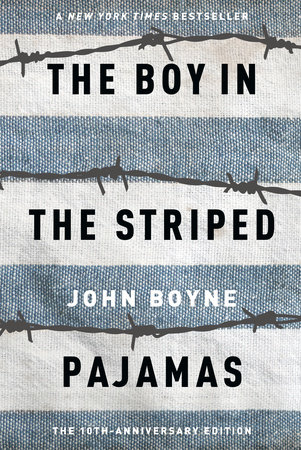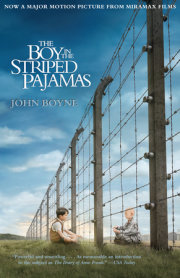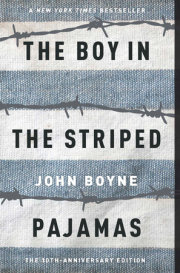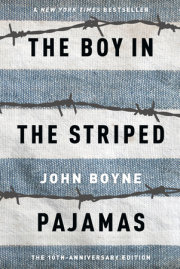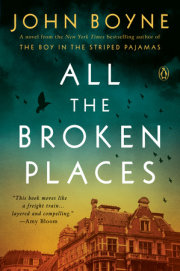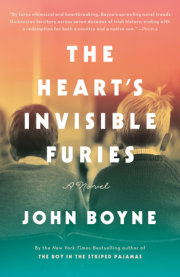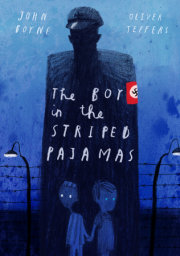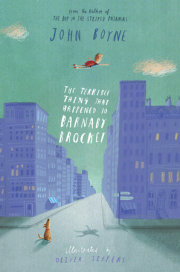Chapter One
Bruno Makes a Discovery
One afternoon, when Bruno came home from school, he was surprised to find Maria, the family’s maid — who always kept her head bowed and never looked up from the carpet — standing in his bedroom, pulling all his belongings out of the wardrobe and packing them in four large wooden crates, even the things he’d hidden at the back that belonged to him and were nobody else’s business.
‘What are you doing?’ he asked in as polite a tone as he could muster, for although he wasn’t happy to come home and find someone going through his possessions, his mother had always told him that he was to treat Maria respectfully and not just imitate the way Father spoke to her. ‘You take your hands off my things.’
Maria shook her head and pointed towards the staircase behind him, where Bruno’s mother had just appeared. She was a tall woman with long red hair that she bundled into a sort of net behind her head, and she was twisting her hands together nervously as if there was something she didn’t want to have to say or something she didn’t want to have to believe.
‘Mother,’ said Bruno, marching towards her, ‘what’s going on? Why is Maria going through my things?’
‘She’s packing them,’ explained Mother.
‘Packing them?’ he asked, running quickly through the events of the previous few days to consider whether he’d been particularly naughty or had used those words out loud that he wasn’ t allowed to use and was being sent away because of it. He couldn’t think of anything though. In fact over the last few days he had behaved in a perfectly decent manner to everyone and couldn’t remember causing any chaos at all. ‘Why?’ he asked then. ‘What have I done?’
Mother had walked into her own bedroom by then but Lars, the butler, was in there, packing her things too. She sighed and threw her hands in the air in frustration before march-ing back to the staircase, followed by Bruno, who wasn’t going to let the matter drop without an explanation.
‘Mother,’ he insisted. ‘What’s going on? Are we moving?’
‘Come downstairs with me,’ said Mother, leading the way towards the large dining room where the Fury had been to dinner the week before. ‘We’ll talk down there.’
Bruno ran downstairs and even passed her out on the staircase so that he was waiting in the dining room when she arrived. He looked at her without saying anything for a moment and thought to himself that she couldn’ t have applied her make-up correctly that morning because the rims of her eyes were more red than usual, like his own after he’d been causing chaos and got into trouble and ended up crying.
‘Now, you don’t have to worry, Bruno,’ said Mother, sitting down in the chair where the beautiful blonde woman who had come to dinner with the Fury had sat and waved at him when Father closed the doors. ‘In fact if anything it’s going to be a great adventure.’
‘What is?’ he asked. ‘Am I being sent away?’
‘No, not just you,’ she said, looking as if she might smile for a moment but thinking better of it. ‘We all are. Your father and I, Gretel and you. All four of us.’
Bruno thought about this and frowned. He wasn’t particularly bothered if Gretel was being sent away because she was a Hopeless Case and caused nothing but trouble for him. But it seemed a little unfair that they all had to go with her.
‘But where?’ he asked. ‘Where are we going exactly? Why can’t we stay here?’
‘Your father’s job,’ explained Mother. ‘You know how important it is, don’t you?’
‘Yes, of course,’ said Bruno, nodding his head, because there were always so many visitors to the house — men in fantastic uniforms, women with typewriters that he had to keep his mucky hands off — and they were always very polite to Father and told each other that he was a man to watch and that the Fury had big things in mind for him.
‘Well, sometimes when someone is very important,’ continued Mother, ‘the man who employs him asks him to go somewhere else because there’s a very special job that needs doing there.’
‘What kind of job?’ asked Bruno, because if he was honest with himself — which he always tried to be — he wasn’t entirely sure what job Father did.
In school they had talked about their fathers one day and Karl had said that his father was a greengrocer, which Bruno knew to be true because he ran the greengrocer’s shop in the centre of town. And Daniel had said that his father was a teacher, which Bruno knew to be true because he taught the big boys who it was always wise to steer clear of. And Martin had said that his father was a chef, which Bruno knew to be true because he sometimes collected Martin from school and when he did he always wore a white smock and a tartan apron, as if he’d just stepped out of his kitchen.
But when they asked Bruno what his father did he opened his mouth to tell them, then realized that he didn’t know himself. All he could say was that his father was a man to watch and that the Fury had big things in mind for him. Oh, and that he had a fantastic uniform too.
‘It’s a very important job,’ said Mother, hesitating for a moment. ‘A job that needs a very special man to do it. You can understand that, can’t you?’
‘And we all have to go too?’ asked Bruno.
‘Of course we do,’ said Mother. ‘You wouldn’t want Father to go to his new job on his own and be lonely there, would you?’
‘I suppose not,’ said Bruno.
‘Father would miss us all terribly if we weren’ t with him,’ she added.
‘Who would he miss the most?’ asked Bruno. ‘Me or Gretel?’
‘He would miss you both equally,’ said Mother, for she was a great believer in not play-ing favourites, which Bruno respected, especially since he knew that he was her favourite really.
‘But what about our house?’ asked Bruno. ‘Who’s going to take care of it while we’re gone?’
Mother sighed and looked around the room as if she might never see it again. It was a very beautiful house and had five floors in total, if you included the basement, where Cook made all the food and Maria and Lars sat at the table argu-ing with each other and calling each other names that you weren’t supposed to use. And if you added in the little room at the top of the house with the slanted windows where Bruno could see right across Berlin if he stood up on his tiptoes and held on to the frame tightly.
‘We have to close up the house for now,’ said Mother. ‘But we’ll come back to it someday.’
‘And what about Cook?’ asked Bruno. ‘And Lars? And Maria? Are they not going to live in it?’
‘They’re coming with us,’ explained Mother. ‘But that’s enough questions for now. Maybe you should go upstairs and help Maria with your packing.’
Bruno stood up from the seat but didn’t go anywhere. There were just a few more questions he needed to put to her before he could allow the matter to be settled.
‘And how far away is it?’ he asked. ‘The new job, I mean. Is it further than a mile away?’
‘Oh my,’ said Mother with a laugh, although it was a strange kind of laugh because she didn’t look happy and turned away from Bruno as if she didn’t want him to see her face. ‘Yes, Bruno,’ she said. ‘It’s more than a mile away. Quite a lot more than that, in fact.’
Bruno’ s eyes opened wide and his mouth made the shape of an O. He felt his arms stretching out at his sides like they did whenever something surprised him. ‘You don’t mean we’re leaving Berlin?’ he asked, gasping for air as he got the words out.
‘I’m afraid so,’ said Mother, nodding her head sadly. ‘Your father’s job is–’
‘But what about school?’ said Bruno, inter-rupting her, a thing he knew he was not supposed to do but which he felt he would be forgiven for on this occasion. ‘And what about Karl and Daniel and Martin? How will they know where I am when we want to do things together?’
‘You’ll have to say goodbye to your friends for the time being,’ said Mother. ‘Although I’m sure you’ll see them again in time. And don’t interrupt your mother when she’s talking, please,’ she added, for although this was strange and unpleasant news, there was certainly no need for Bruno to break the rules of politeness which he had been taught.
‘Say goodbye to them?’ he asked, staring at her in surprise. ‘Say goodbye to them?’ he repeated, spluttering out the words as if his mouth was full of biscuits that he’d munched into tiny pieces but not actually swallowed yet. ‘Say goodbye to Karl and Daniel and Martin?’ he continued, his voice coming dangerously close to shouting, which was not allowed indoors. ‘But they’re my three best friends for life!’
‘Oh, you’ll make other friends,’ said Mother, waving her hand in the air dismissively, as if the making of a boy’s three best friends for life was an easy thing.
‘But we had plans,’ he protested.
‘Plans?’ asked Mother, raising an eyebrow. ‘What sort of plans?’
‘Well, that would be telling,’ said Bruno, who could not reveal the exact nature of the plans — which included causing a lot of chaos, especially in a few weeks’ time when school finished for the summer holidays and they didn’t have to spend all their time just making plans but could actually put them into effect instead.
‘I’m sorry, Bruno,’ said Mother, ‘but your plans are just going to have to wait. We don’t have a choice in this.’
‘But, Mother!’
‘Bruno, that’s enough,’ she said, snapping at him now and standing up to show him that she was serious when she said that was enough. ‘Honestly, only last week you were complaining about how much things have changed here recently.’
‘Well, I don’t like the way we have to turn all the lights off at night now,’ he admitted.
‘Everyone has to do that,’ said Mother. ‘It keeps us safe. And who knows, maybe we’ll be in less danger if we move away. Now, I need you to go upstairs and help Maria with your packing. We don’t have as much time to prepare as I would have liked, thanks to some people.’
Bruno nodded and walked away sadly, know-ing that ‘some people’ was a grown-up’s word for ‘Father’ and one that he wasn’t supposed to use himself.
He made his way up the stairs slowly, holding on to the banister with one hand, and wondered whether the new house in the new place where the new job was would have as fine a banister to slide down as this one did. For the banister in this house stretched from the very top floor — just outside the little room where, if he stood on his tiptoes and held on to the frame of the window tightly, he could see right across Berlin — to the ground floor, just in front of the two enormous oak doors. And Bruno liked nothing better than to get on board the banister at the top floor and slide his way through the house, making whooshing sounds as he went.
Down from the top floor to the next one, where Mother and Father’s room was, and the large bathroom, and where he wasn’t supposed to be in any case.
Down to the next floor, where his own room was, and Gretel’s room too, and the smaller bath-room which he was supposed to use more often than he really did.
Down to the ground floor, where you fell off the end of the banister and had to land flat on your two feet or it was five points against you and you had to start all over again.
The banister was the best thing about this house — that and the fact that Grandfather and Grandmother lived so near by — and when he thought about that it made him wonder whether they were coming to the new job too and he presumed that they were because they could hardly be left behind. No one needed Gretel much because she was a Hopeless Case — it would be a lot easier if she stayed to look after the house — but Grandfather and Grandmother? Well, that was an entirely different matter.
Bruno went up the stairs slowly towards his room, but before going inside he looked back down towards the ground floor and saw Mother entering Father’s office, which faced the dining room — and was Out Of Bounds At All Times And No Exceptions — and he heard her speaking loudly to him until Father spoke louder than Mother could and that put a stop to their conversation. Then the door of the office closed and Bruno couldn’t hear any more so he thought it would be a good idea if he went back to his room and took over the packing from Maria, because otherwise she might pull all his belongings out of the wardrobe without any care or consideration, even the things he’d hidden at the back that belonged to him and were nobody else’s business.
Copyright © 2006 by John Boyne. All rights reserved. No part of this excerpt may be reproduced or reprinted without permission in writing from the publisher.

